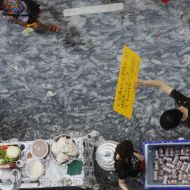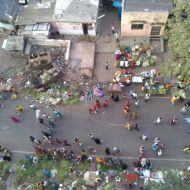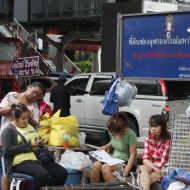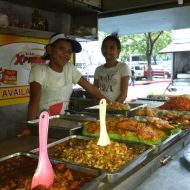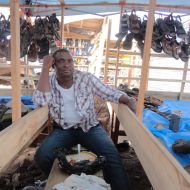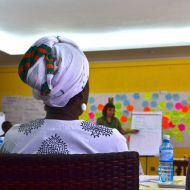The Fixers Who Helped Tell the Story of the Informal City, and Live It Every Day
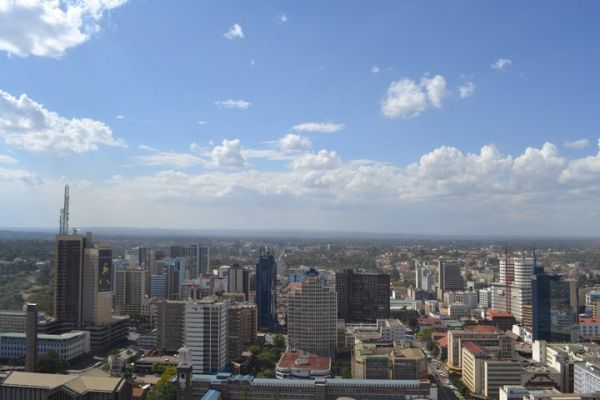
Covering the news in Nairobi would not be possible without the help of our writer’s indispensible fixers. Photo credit: Sam Sturgis
Jua kali is a Swahili phrase meaning “hot sun” and refers to the open-air businesses that line Nairobi’s streets. The jua kali sector provides informal employment to hundreds of thousands in Kenya’s capital, from welders to carpenters to mechanics to hairdressers. But jua kali is also a term for the improvisational spirit that all Nairobians must draw on to get by in a city crushed by corruption, poverty and bad infrastructure. Indeed, Nairobi, the capital of East Africa’s biggest economy, runs on jua kali.
It’s been my task to write about that jua kali spirit for the Informal City Dialogues, to show how Nairobians improvise to get everything from water and electricity to education and recycling. Any success I’ve had here, however, is due in large part to the help of a few good friends, my fixers. Fixers are knowledgeable locals hired by journalists to take care of logistics. They are as vital to journalism as reporters and editors, engaged in the unsung work of arranging meetings, translating interviews and occasionally talking officials out of bribes. Without fixers, there is no news.
I’d like to honor two fixers, Josh and Fred, who have helped me the most, and let them to tell you about themselves and their city. I first met Josh last year while writing a story about citizen journalists in Kibera, and interviewed him a couple weeks ago in the offices of the Kibera News Network, where he works. I met Fred about a year ago as well, during a riot after a bus bombing — I interviewed him recently in his new home in Mathare. I think their stories show the struggles and realities of being a Nairobian. Thanks for your help, guys.
Josh
My name’s Owino Joshua. I’ve lived in Kibera since 2008. I’m a humble man. I do electronics equipment repairing. I fix televisions, DVDs, speakers, stuff like that. I’m also a reporter and editor for Kibera News Network. I was born upcountry in Siaya. My parents could not afford my fees to join university so in 2002 after high school I moved to Naivasha to join my brother who was already staying there. I did a lot of odd jobs, construction, I worked in flower farms. Then I decided to train myself in electronics.
Naivasha was one of the places that was most hard hit by the post-election violence of ‘07, ‘08. One morning I was going to my job, I worked as a bartender, and there were no people around and I felt that was something strange. My friend, he came and told me, “Hey Josh, what are you doing here? Mungikis [an ethnic gang] are coming to clear people. You better close your business.” So I went to my house where I was with my cousin. I had my small radio and I heard the news: “Naivasha erupts.” I could see Mungikis outside with knives and clubs. You could even hear people crying who were being slashed to death. They came up to our gate and were knocking. The police were overwhelmed so there was reinforcement from the prison officers. I peeped through the window at some uniformed prison wardens, and some were my customers from my pub so I decided to run for it and join them, and they took us to the prison warden’s camp for safety. We stayed at the camp for four days and then went upcountry for things to settle down.
My home in Naivasha was burned so I decided to come to Kibera to stay with my cousin. I came alone. I boarded a bus and I just had my bag with my clothes and my phone. The first days it was hard. I had been to Kibera before and I was like, this is a very bad place to be. So dirty. Everywhere it was smelling, and the mud when it rains is so much you can’t even walk. I thought, how do people survive here? I never imagined that I’d ever live in Kibera. But I found myself in Kibera, and I was like, okay, this is life. I have to live it.
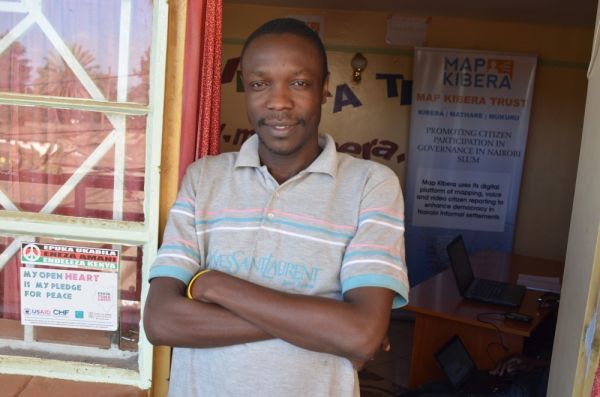
Owino Joshua outside the KNN offices.
It took me four months to find myself a place to start my electronics work. I had saved some money from bartending to start a shop. It’s doing well. Sometimes you get 500 shillings ($5.70 USD) in a day, [sometimes] 300. It varies a lot. With KNN I average 15,000 ($170) a month.
I met my wife in Kibera in the market where I fix electronics. She had a business, she was tailoring next to me, and we became friends and then we became close. We have one daughter. She’s now two-and-a-half years old.
In 2010 I heard about KNN and I decided to join. Kibera is misrepresented, so things like KNN report issues from a Kibera point of view. My childhood dream was to become a journalist, a professional journalist, and it’s still inside me. Being in KNN as a citizen reporter, I see it as a platform to jump into where I want to be. What I want is to go back to school and study journalism, but I can’t afford the fees right now.
Now I consider myself a full Kibera resident. I’m a Nairobian, but mostly a Kiberan. I don’t know how to call it, but Kibera, is it the heartbeat of Nairobi? I just feel it’s a good place to be, especially for the people that are not financially stable. There are people who can’t afford water and electricity so Kibera gives a space for such people to be able to sustain themselves.
Many people want to know what’s happening in Kibera. What they hear in the news is so shocking, but what they hear in the news is wrong. Even Kenyan mainstream media comes to Kibera to expose Kibera in a bad way — how filthy it is, how people are living in mud houses — which is true, but there is also good things about Kibera. Let people come so that they see it themselves. They will see that nothing is so bad about Kibera. People are just living and doing their thing.
I’m happy living in Kibera but that doesn’t mean I’m comfortable. I’d be happy to move out of Kibera and become an example for others. But for now I just have to be happy. Life is a journey that somebody has to walk and sometimes it takes you the bad way, sometimes it takes you the good way. So if it takes you the bad way let it come the way it is. You should not start crying and blaming people. Just find your way out.
Fred
My names are Fred Njoroge Ndichu, but I have almost twenty nicknames, like Njoro, One-Fifty, Wanchuani. I was born in 1989. I came to Mathare back in 1994. My parents used to stay in West Pokot, but the Kikuyus were being chased away so we had to move very fast out of there to save our lives. We are ten children now, and I’m fifth born. That same house where we came in 1994 my mother has never moved from. It’s a bit of a batty house, but we are just good with it because it’s all we have.
I went to school in Mathare. It was very tough because at that time there was no free school. We had to pay for everything, including food. I got a sponsor from class one to class seven from the World Vision, an organization that helps slum children and pays school fees for them. But in class seven they moved, so my mother had to struggle again to pay. She used to cook githeri [stewed beans and corn] and would take it in buckets to where people are building houses and sell there.
I went to high school in Dandora because my father went to stay there, but I had very big problems because of school fees. I continued until second year and then I backed down. I thought, I don’t have school fees, maybe it’s time I quit. I stayed with my father and he took me to work in the dumping site. For one year we were there. We could make some cash, but I didn’t enjoy it very much because it was very smelly and all that stuff, and also there are these mungiki guys and they could come and steal from you and there was nothing you could do.
So I came back and lived with my mom in Mathare. When I came here I made new friends and we formed a youth group. Sometimes our youth group does garbage collection for business. We got a 50,000 shillings ($570) loan from the government and we split between ten people, 5,000 ($57) each. My brother and I went and bought two secondhand PlayStations and one television and started a business. Customers can pay five bob (six cents) for one movie, and each video game that the kids play, they pay ten bob. We show football matches too, but I could not afford my own DSTV. It’s almost 60,000 shillings ($685). My friend organized a cable from his place. It’s an illegal one. Each month I pay him 1,500 ($17). From the video I make 800 ($9.14) per week, and PlayStation I can make, like, 600 ($6.85) per week. But we are two people so we have to split. Business is good now because the school is closed, but come school time everything changes and we don’t make any money.
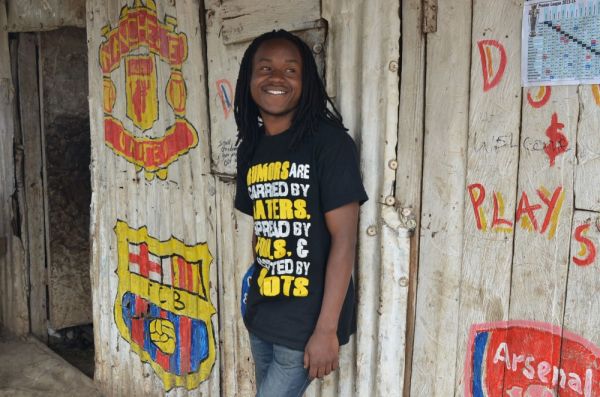
Fred Njoroge outside of his video hall.
When we opened our business we had a tough time because the police found us as a place where they could just harass people. The problem with the police is that everything you do with your business in Mathare, there’s always some mistake they look for. They come and say, “You are keeping thieves here. Why are they here doing nothing?” Or, “Where does the electricity come from? Do you pay an electricity bill?” So you give them something and they leave, but it’s not the end of it. Last week they came, almost seven of them with a truck, and they took all my customers into their truck. They were like, “If you do not have 10,000 ($115), we are not releasing them.”
I even moved into this place four months ago because of the police. I used to sleep in the video hall. But one day I could hear a knock and they were like, “Why are you hiding? Where is our stuff? You want us to take you to jail?” They just got in and arrested me. So I took all my things to my friend and I stayed with him two weeks until I found this vacant room.
But it’s just normal. It’s just what the police do. Sometimes I get this feeling that I want to close that video hall down. I even talked to one policeman, I asked him, “Do you want me to close here and go and steal?” In two months I’ve been going in my own pockets to pay the rent because the police came and took my profits.
I like Mathare, but I don’t wish to stay here forever. People are friendly. They help each other. It’s not like a place where people are strange and don’t talk to you. When people talk about slums they think this place is very weird. They see open sewers, houses congested together, but I can just tell them I’m used to it. Mathare is not a bad place to stay. Crime is very high here, I cannot lie about that. And when you look around, these young people are not employed. They just wish that anything bad could happen so they could start looting.
Let’s give it years to come. I think things will be changed. My brother is in school. He got sponsored and his sponsor didn’t leave him, and now he’s in Kenyatta University. The small kids are learning. At least now school is free. Buildings are continuing to be built. Schools are being built. There’s a market that wants to be opened here. So maybe next year we’ll hear good news about Mathare.
Me, call me a hustler. I’m just there. I live, I survive, and given an opportunity to do something I can do it very well. I know that.
Photos by Jason Patinkin. Interviews have been edited for brevity and clarity.

